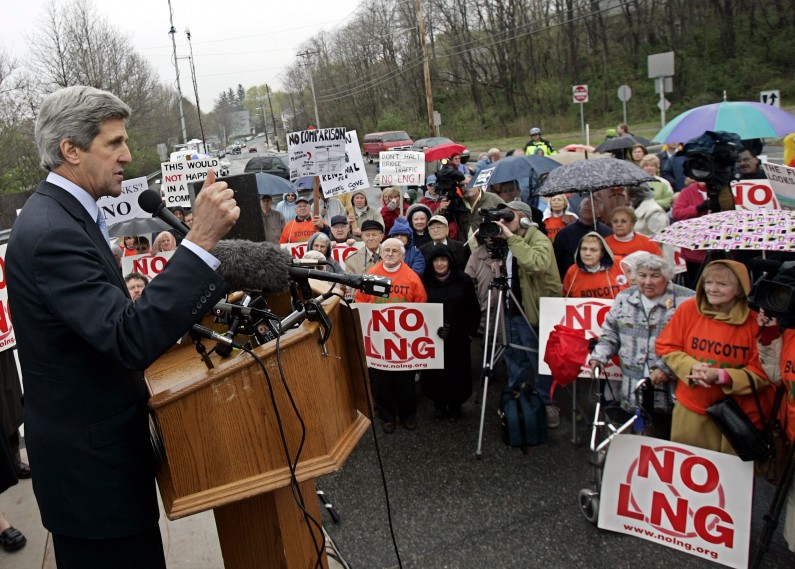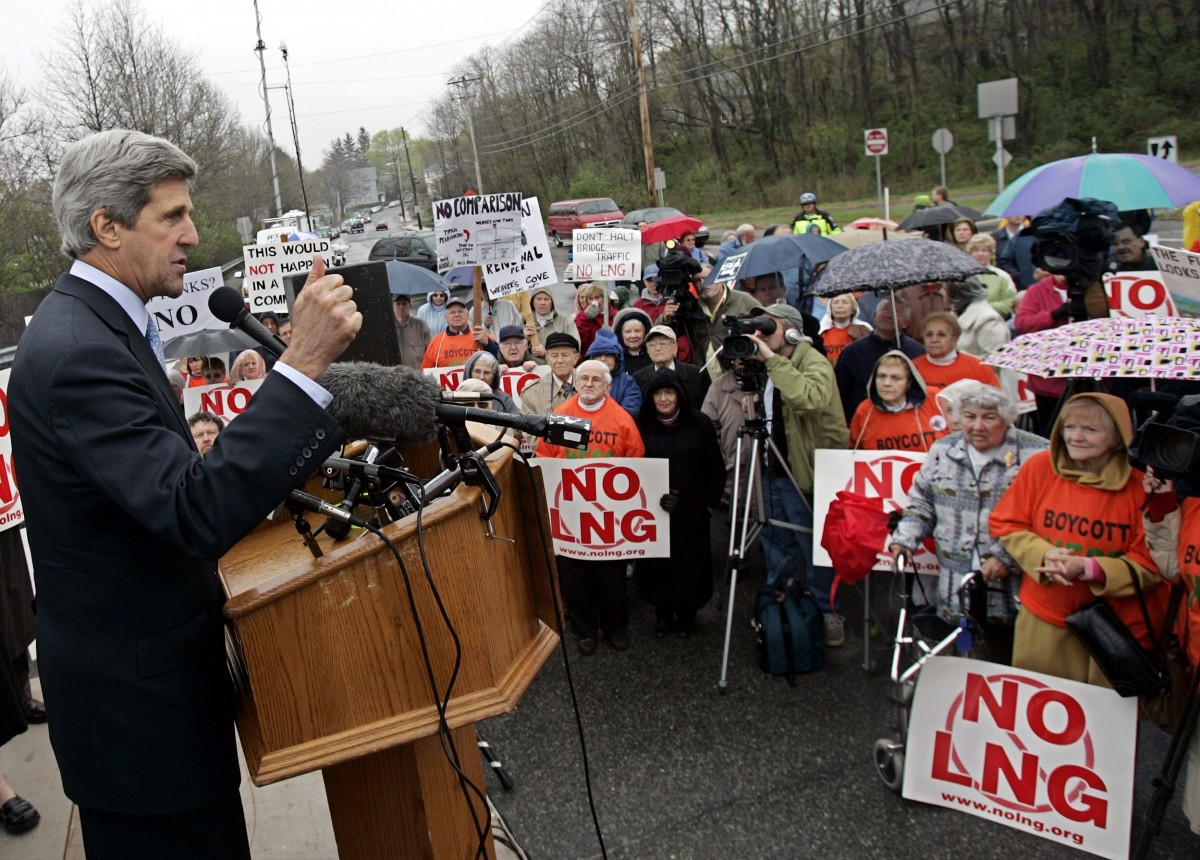
WASHINGTON — By a large majority, a U.S. House of Representatives committee this week approved a bill that would step up the approvals process for the export of domestically produced natural gas, a move that critics say will either raise U.S. prices or lead to a broad expansion of controversial hydraulic fracturing operations.
The 33-18 vote included five Democrats and all Republicans on the House Energy and Commerce Committee, giving momentum to an issue that has long been urged by the oil and gas industry. Although exports of U.S. oil and gas have been severely curtailed since the 1970s, recent months have seen strong bipartisan action on proposals to start lifting these curbs.
Any bipartisan action is few and far between in today’s polarized Congress, yet support for liquefied natural gas (LNG) exports has increased substantially in recent weeks, largely because of the geopolitical crisis that continues to unfold between Ukraine and Russia. Ukraine has long been particularly dependent on Russian gas, and as Washington policymakers have sought ways to increase their leverage in the current situation, many have increasingly focused on the potentially potent opportunity offered by strengthening energy supply.
“By passing [this bill], we are sending a clear signal to the world that the U.S. is serious about exporting LNG to our friends abroad,” Rep. Cory Gardner (R-CO), the lead sponsor of theDomestic Prosperity and Global Freedom Act, said Wednesday after his proposal passed the committee.
“Coupled with the fact that the United States is blessed with an abundant source of natural gas, [the bill] presents us with the unique opportunity to strengthen our allies, weaken our enemies, and create economic opportunities here at home.”
The full House is expected to vote on Gardner’s proposal quickly – likely this month. Yet the bill did major changes during the course of committee negotiations.
Rep. Gardner and other proponents of opening up LNG exports have pushed to change U.S. law to allow for such sales to all 159 members of the World Trade Organization, roughly three-quarters of all countries in the world. Yet the bill that passed this week would reiterate current law, which would only allow for exports to go to the roughly 20 countries with which the United States has a bilateral trade agreement.
Still, Gardner’s bill would significantly step up the federal approvals process for LNG export applications. Under the current proposal, the Energy Department would be required to decide on an application within three months of the end of a required public comment period. Some three dozen, currently pending applications, too, would need to be decided upon within three months of the law’s going into effect.
Despite the negotiated result, the oil and gas industry lauded the final bill.
“The case for natural gas exports is clear, and Congress is ready to see those benefits flow to U.S. workers,” Jack Gerard, the head of the American Petroleum Institute, a lead industry lobby group, said Thursday in a statement.
“America is now the world’s top producer of natural gas, and opening the doors to trade will allow us to harness that power on the international stage while bringing home thousands of jobs and growing our economy.”
Independence vs exports
With approval of an expansion in LNG exports now likely from the full House of Representatives, critics of Rep. Gardner’s proposal are turning their focus to the U.S. Senate. Last week, a coalition of those opposed to expedited gas exports delivered some 182,000 petitions to key senators, urging them to reject an expansion.
“Although these plans have been percolating for a while, LNG in general is still a new phenomenon to everyday Americans,” Kate Fried, a spokesperson with Food and Water Watch, a watchdog group here that coordinated the recent petition drive, told MintPress. “Yet these petitions demonstrate that people who know about this are clearly rejecting these plans.”
While the United States is suddenly a leading producer of natural gas, this only came about in recent years and only because of the introduction of new technologies that are able to access hard-to-reach gas deposit – particularly horizontal drilling and hydraulic fracturing, or “fracking.”
Fracking has increasingly been tied to concerns over both human and environmental health and safety, though the industry continues to deny that any problems are linked to gas production. Now, Food and Water Watch and others are expressing concerns that significant new overseas demand for U.S. natural gas would inevitably result in an expansion of fracking in the United States.
“The negative effects we’ve already seen around fracking are only going to increase if we’re increasing LNG exports,” Fried says.
“Further, this new push behind LNG exports highlights a bit of the oil and gas industry talking out of both sides of its mouth. Originally, their rhetoric on fracking was that it would lead to greater U.S. energy independence. Yet now they’re saying they want to export – so which is it?”
Some major U.S. manufacturers have also expressed skepticism about the gas industry’s claims that exports would strengthen the job market and broader economy. On Monday, United Steelworkers, a union representing around 850,000 members, called the House proposal “irresponsible.”
“If LNG exports are expanded, the winners will be owners of natural gas resources and the losers will be American consumers and the manufacturing sector,” Leo W. Gerard, the international president for United Steelworkers,warned the leaders of the House Energy and Commerce Committee.
“It is incumbent upon policymakers to make a choice in deciding whether to expand natural gas exports, between promoting and retaining manufacturing in America, or promoting and growing fossil energy corporate profits at the cost of jobs and harm to consumers, whose labor income will decrease and whose energy costs will increase with increased natural gas exports.”
Cyclical investments
Getting an export license from the Energy Department is, of course, a critical first step for any company aiming to start selling U.S. natural gas overseas. But if Washington is serious about significantly stepping up LNG exports, a key consideration remains the expensive infrastructure necessary to transport the gas, liquefy it and put the final product on oceangoing ships.
The coastline terminals able to carry out this type of work have been few and far between, in part because of legal complications but also simply because the United States has never before been in a situation where it had enough gas to seriously contemplate exporting it. In recent years, however, the Obama administration has quietly started examining applications for these terminals, and has already approved seven.
Still, building or repurposing an LNG export terminal is extremely expensive. In Maryland, for instance, where proponents want to convert a gas import facility into an export terminal, the process would cost an estimated $3.8 billion, according to Dominion, the company making the proposal. Federal legislative action to expand potential overseas markets is therefore important in order for the industry to raise the investment capital for any such construction work in the first place.
Yet green groups and public health experts worry about the cyclical impact of such action. Making such massive investments would not only necessitate greater gas production in the United States, they say, but it would also increasingly tie the U.S. economy and energy grid into a reliance on fossil fuel production.
“Once we’ve build up that infrastructure, we’ll also lock America’s energy future into dirty gas and away from wind, solar and other sustainable alternatives,” John Rumpler, a senior attorney with Environment America, an advocacy group, told MintPress.
“Some in the U.S. see this whole debate as far away and abstract. But if you’re living on the front lines of fracking – your neighbor’s well water has been polluted or your daughter has had to be hospitalized – you don’t think where the gas is being used. You just know this dirty drilling process is poisoning your community.”
In areport from October, Environment America estimated that fracking operations had created some 280 billion gallons of wastewater in 2012 alone, in addition to around 450,000 tons of air pollution.
“The bottom line here,” Rumpler says, “is that dirty gas exports will mean more contamination of our land, water and air.”


